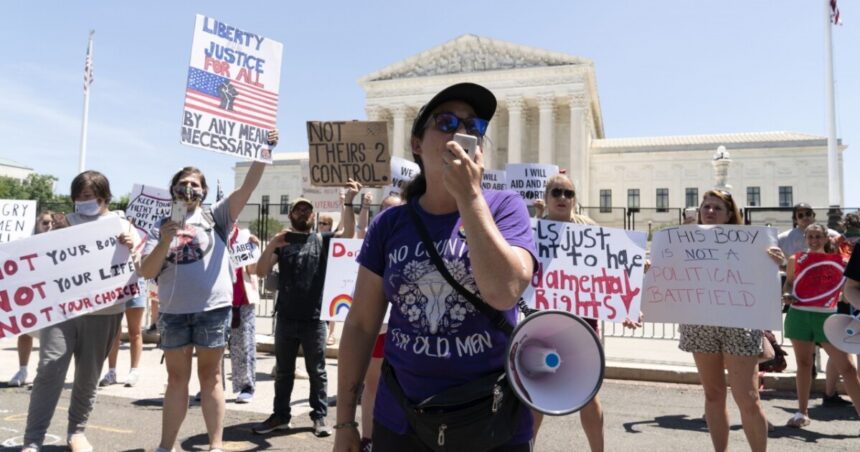Two years after the Supreme Court decision that overturned Roe v. Wade, the national landscape regarding abortion access is inconsistent, fragmented, and on the brink of the upcoming election.
In various states, ballot measures are being proposed that could alter state constitutions to establish abortion access as a fundamental right if approved. Pennsylvania and Nebraska are considering measures that would either ban or further restrict abortion access by amending their state constitutions.
“The Dobbs decision marked the beginning of a new era in American politics,” stated Rachel O’Leary Carmona, executive director of Women’s March. “It not only impacted women but also had implications for democracy.”
The Center for Reproductive Rights has been monitoring changes in state laws since the Dobbs v. Jackson Women’s Health Organization case. They found that 17 states currently have complete bans on abortion or bans after six weeks of pregnancy, which is before many women are aware of their pregnancy. Additionally, eight states impose restrictions before viability.
Conversely, 22 states have expanded or safeguarded abortion access since the Dobbs decision. In 17 states, healthcare providers can treat patients from out of state.
This inconsistent patchwork creates uncertainty for pregnant individuals. Kate Cox from Texas, who previously sued the state over abortion due to a nonviable pregnancy, is now pregnant again. She expressed her concerns saying, “If I face an emergency, my initial call would be to my lawyer, and my second call would be to my doctor.”
This fall, four states will have ballot initiatives to amend their state constitution and secure the right to abortion. An additional six states are in the process of gathering or submitting signatures for the same purpose.
In some instances, these initiatives are driven by citizens through the ballot initiative process, where issues are put up for a vote with the required citizen signatures. This process is not available in half of the states in the U.S.
Those opposed argue that this form of direct democracy could be risky, as citizens are bypassing elected officials to enact or repeal laws.
The origins of this concept date back to South Dakota in 1898, and since then, 21 other states have adopted similar measures. However, little has changed over the years.
In states without the citizen initiative process, the majority does not necessarily get the outcome they desire.
For instance, in Texas where there is a strict abortion ban, a recent poll revealed that most Texans believe abortion should be legal under many circumstances. In Louisiana, where abortion is nearly entirely prohibited, a survey showed that 53% of the population opposes the law.
In states with citizen ballot initiatives, efforts are underway to advocate for desired outcomes. For example, in Florida where abortions are currently restricted after six weeks, citizens are working to pass a measure this fall that would secure abortion access in the state constitution. Similarly, in Nebraska which has a 12-week ban, citizens are collecting signatures for three constitutional amendments: one to establish abortion rights, another to ban second and third-trimester abortions, and a third to recognize fetal personhood.
However, pushing for citizen initiatives in states without this process can be challenging.
In West Virginia, a mayor initiated a petition for a ballot initiative process, but it failed to gain traction in the Republican-controlled legislature. In Tennessee, the Republican House Majority Leader viewed ballot measures as akin to polls rather than the legislature’s thorough review of complex policy-making, according to The Associated Press.
Related stories:
Biden campaign emphasizes abortion stance on 2-year anniversary of Dobbs decision





